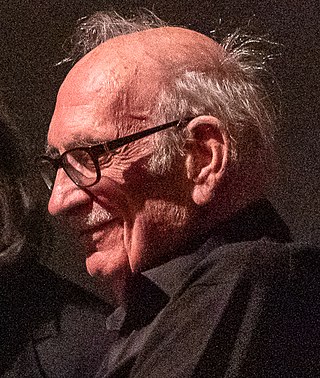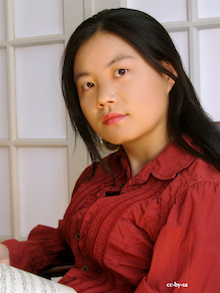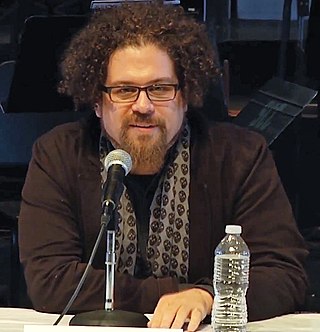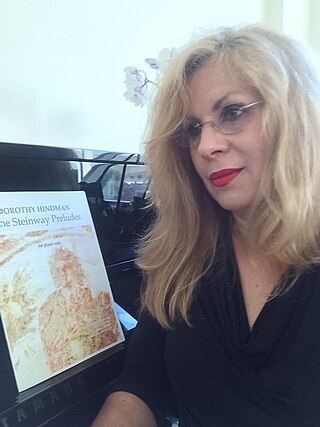Related Research Articles

George Henry Crumb Jr. was an American composer of avant-garde contemporary classical music. Early in his life he rejected the widespread modernist usage of serialism, developing a highly personal musical language which "range[s] in mood from peaceful to nightmarish". Crumb's compositions are known for pushing the limits of technical prowess by way of frequent use of extended techniques. The unusual timbres he employs evoke a surrealist atmosphere which portray emotions of considerable intensity with vast and sometimes haunting soundscapes. His few large-scale works include Echoes of Time and the River (1967), which won the 1968 Pulitzer Prize for Music, and Star-Child (1977), which won the 2001 Grammy Award for Best Contemporary Classical Composition; however, his output consists of mostly music for chamber ensembles or solo instrumentalists. Among his best known compositions are Black Angels (1970), a striking commentary on the Vietnam War for electric string quartet; Ancient Voices of Children (1970) for a mixed chamber ensemble; and Vox Balaenae (1971), a musical evocation of the humpback whale, for electric flute, electric cello, and amplified piano.
George Rochberg was an American composer of contemporary classical music. Long a serial composer, Rochberg abandoned the practice following the death of his teenage son in 1964; he claimed this compositional technique had proved inadequate to express his grief and had found it empty of expressive intent. By the 1970s, Rochberg's use of tonal passages in his music had provoked controversy among critics and fellow composers. A professor at the University of Pennsylvania until 1983, Rochberg also served as chairman of its music department until 1968. He became the first Annenberg Professor of the Humanities in 1978.

Leonardo Balada Ibáñez is a Catalan American classical composer, who is noted for his operas and orchestral works.

Tania León is a Cuban-born American composer of both large scale and chamber works. She is also renowned as a conductor, educator, and advisor to arts organizations.

Jennifer Elaine Higdon is an American composer of contemporary classical music. She has received many awards, including the 2010 Pulitzer Prize for Music for her Violin Concerto and three Grammy Awards for Best Contemporary Classical Composition for her Percussion Concerto in 2010, Viola Concerto in 2018, and Harp Concerto in 2020. Elected a Member of the American Philosophical Society in 2019, she was a professor of composition at the Curtis Institute of Music from 1994 to 2021.

Sylvia Olden Lee was an American vocal coach and accompanist. She was the first African-American to be employed by the Metropolitan Opera. Her fields of expertise were European classical music and Negro spirituals.
Olatunji Akin Euba, was a Nigerian composer, musicologist, and pianist.
The Carnegie Mellon School of Music in Pittsburgh, Pennsylvania, is a degree-granting institution founded in 1912 as one of five divisions of Carnegie Mellon University's College of Fine Arts.
Nancy Galbraith is an American postmodern/postminimalist composer. She is professor of composition at Carnegie Mellon University.
Gabriela Lena Frank is an American pianist and composer of contemporary classical music.
Eduardo Alonso-Crespo is an Argentine composer of classical music.
Lorna McGhee is a Scottish flutist and teacher, who since 2024 helds the position of Principal Flute at the Boston Symphony Orchestra. She served as Principal Flute of the Pittsburgh Symphony Orchestra from 2012 to 2024. In addition, she is an Artist Lecturer in Flute at Carnegie Mellon University. Past positions include co-principal flute of the BBC Symphony Orchestra and associate professor of flute at the University of British Columbia. She is currently a member of a flute, viola, and harp ensemble, 'Trio Verlaine' with her husband, violist David Harding and harpist Heidi Krutzen. McGhee is known for her "luscious tone colors and dynamics."
Reza Vali is an Iranian musician and composer.

Wang Jie is a Chinese-born American composer.

David T. Little is a Grammy-nominated American composer, record producer, and drummer known for his operatic, orchestral, and chamber works, most notably his operas JFK,Soldier Songs, and Dog Days which was named a standout opera of recent decades by The New York Times. He is the artistic director of Newspeak, an eight-piece amplified ensemble that explores the boundaries between rock and classical music, and is the Chair of the composition faculty at Mannes School of Music.
Valerie Coleman is an American composer and flutist as well as the creator of the wind quintet Imani Winds. Coleman is a distinguished artist of the century who was named Performance Today's 2020 Classical Woman of the year and was listed as “one of the Top 35 Women Composers” in the Washington Post. In 2019, Coleman's orchestral work, Umoja, Anthem for Unity, was commissioned and premiered by the Philadelphia Orchestra. Coleman's Umoja is the first classical work by a living African American woman that the Philadelphia Orchestra has performed.
Ilana Davidson is an American operatic soprano who has had an active international career in opera and concert. She has sung on several recordings, including as a soloist on a recording of William Bolcom's Songs of Innocence and of Experience with Leonard Slatkin and the University of Michigan chorus and orchestra which won four Grammy Awards including Best Classical Album in 2006. She is the co-artistic director of the Chamber music series ClassicalCafe.

Black conductors are musicians of African, Caribbean, African-American ancestry and other members of the African diaspora who are musical ensemble leaders who direct classical music performances, such as an orchestral or choral concerts, or jazz ensemble big band concerts by way of visible gestures with the hands, arms, face and head. Conductors of African descent are rare, as the vast majority are male and Caucasian.

Dorothy Hindman is an American composer and music educator.
Joyce Mathis was an American soprano who was a concert artist, recitalist, and opera singer from the 1960s into the early 1990s. She is considered a part of the first generation of black classical singers to achieve success in the United States; breaking down racial barriers within the field of classical music. She won several notable singing competitions, including the Marian Anderson Award in 1967 and the Young Concert Artists in 1968. In 1970 she recorded the role of the High Priestess in Verdi's Aida alongside Leontyne Price and Plácido Domingo. Pulitzer Prize-winning composer Ned Rorem wrote his song cycle Women's Voices for her in 1975. In 1976 she created the role of Celestina in Roger Ames's opera Amistad at the John F. Kennedy Center for the Performing Arts. She appeared frequently in performances with Opera Ebony and the Boys Choir of Harlem in addition to touring widely as a recitalist and concert soprano.
References
- 1 2 Anderson, E. Ruth (1982). Contemporary American Composers, 2nd ed., p.309. G. K. Hall, Boston. ISBN 0-8161-8223-X.
- ↑ Press, Jaques Cattell, ed. (1983)(1985). Who's Who in American Music: Classical, 1st ed., p. 92; 2nd ed., p. 123. R. R. Bowker, New York. ISBN 0-8352-2074-5.
- ↑ Cummings, David M., & McIntire, Dennis, K., eds (1990). International Who's Who in Music and Musicians' Directory, p. 160. International Who's Who in Music, Cambridge, England. ISBN 0-948875-20-8.
- ↑ Mack, Elaine B. (2009). Black Classical Musicians in Philadelphia: Oral Histories Covering Four Generations, pp. 212-218. Writing Our World, Little Rock. ISBN 978-0-9767356-0-1.
- ↑ Pittsburgh Courier, Local Edition, CMU Concert to Star Black Girl, December 15, 1973, p. 17.
- 1 2 Pittsburgh Courier, Local Edition, Meeting of Two Musical Worlds: Black and Avant-Garde Sound, April 12, 1975, p. 24.
- 1 2 3 4 Pittsburgh Courier, Local Edition, Cynthia Lee Tops Winning Tradition, September 6, 1975, p. 8.
- 1 2 The Philadelphia Tribune, Phila. Composer Awarded Nat'l Premiere, September 3, 1985, p. 5B.
- ↑ The Philadelphia Tribune, Weekend Portfolio, Classical Music Now on WPEB Radio, May 28, 1982, p. 6.
- 1 2 University of Pennsylvania, Music Department.
- ↑ Maryland State Archives, Hall of Records, Annapolis, MD, Collection Reference Number MdHR G 1729.
- 1 2 3 Hartle, Amanda (July 10, 2020). "Concerto of Change". Carnegie Mellon University . Retrieved February 25, 2024.
- 1 2 3 Holder, Nathan. (2020). Where Are All The Black Female Composers? The Ultimate Fun Facts Guide, pp. 52-53. Holders Hill Publishing, Willenhall, England. ISBN 978-1-9997530-3-0.
- 1 2 3 Roland Leich collection (MSS 52), MSS 52, Box: MSS C, Folder: 5-10. Curtis Institute of Music Archives.
- 1 2 3 4 Cynthia Cozette Lee Collection, 2 Boxes, Pittsburgh Music Archive #9. Music Department, Carnegie Library of Pittsburgh.
- ↑ Sadie, Stanley, ed. & Tyrrell, John, executive ed. (2001). The New Grove Dictionary of Music and Musicians, 2nd ed., vol. 15, p. 748. Macmillan, New York. ISBN 1-56159-239-0.
- ↑ Anderson, E. Ruth (1982). Contemporary American Composers, 2nd ed., Leich, p. 312, Rochberg pp. 434-435. G. K. Hall, Boston; ISBN 0-8161-8223-X.
- ↑ Curtis Institute of Music, The John de Lancie Library.
- ↑ Rosario Scalero Biographical Sketch, Curtis Institute of Music, The John de Lancie Library.
- 1 2 3 "Africa Enchants Me A Top Cultural Event". The Philadelphia Sunday Sun. 11 June 2016. Retrieved 25 February 2024.
- 1 2 3 "Cynthia Cozette Lee" . Retrieved 2024-02-25.
- 1 2 3 "Award-winning African American Classical Composer's Art Song World Premiere". The Philadelphia Sunday Sun. 28 April 2023. Retrieved 25 February 2024.
- ↑ Lee, Cynthia Cozette. (2010). D.O.O.R.S. of Change: Capacity Building To Differentiated Instruction (Rowan University) (Doctoral Dissertation). Available from ProQuest Dissertations & Theses database. (UMI No. 3396307).
- ↑ "Cynthia Cozette Lee" . Retrieved 2024-02-25.
Extended References
- Arnold Arnstein Interview with Cynthia Cozette Lee (Transcription). (1982, November 11), Roland Leich Collection, 1976 to 2010, (Box MSS C, Folder 5-10), John de Lancie Library, Curtis Institute of Music, Philadelphia, PA.
- Orchestral Music of Women of African Descent - Cynthia Cozette Lee. (n.d.). Women's Philharmonic Advocacy.
- Younge, E. M. (February 22, 2013). "Partway To Freedom - A Civil War Opera", eryounge.blogspot.com. Accessed February 20, 2024.
- G., Perry. (March 16, 2015). Partway to Freedom, FreeLibrary.org. Accessed February 20, 2024.
- Donahue, B. (February 6, 2017). Rowan's Faculty Spotlight Concert Honors Black History Month., thewhitonline.com. Accessed February 20, 2024.